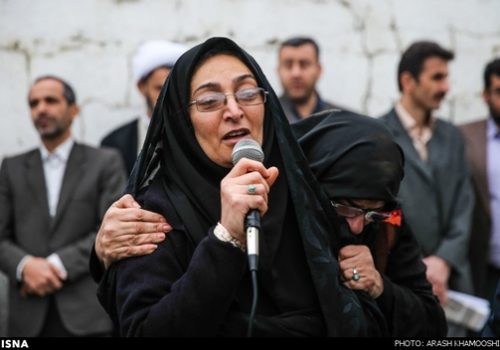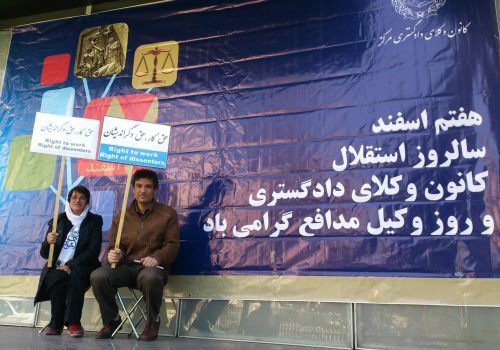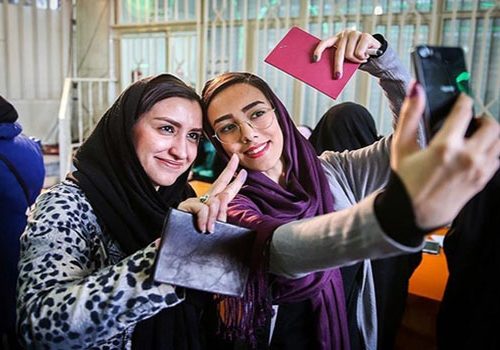#Don’tExecute: A semi-successful campaign against capital punishment in Iran
For the third time in less than two months, Iranians took to Twitter in late August to express their outrage over another death sentence handed out to a protester. While the hashtags themselves have changed, shifting from #اعدام ـ نکنید (Don’t Execute) to #لغو ـ فوری ـ اعدام (Stop Executions Now) and back to the #Don’tExecute, as well as #SaveNavidAfkari, the message has remained the same: protesting against the regime should not be a death sentence. The regime’s response has been equally as clear: protesting against the regime will not be tolerated and will be met with the harshest of punishments.
The social media campaigns began in mid-July when the Iranian Supreme Court upheld the death sentences of three young men—Saeed Tamjidi, Mohammad Rajabi, and Amir Hossein Moradi—who had participated in the widespread protests of November 2019 and were referred to as “among the main rioters” by officials. On July 14, the #Don’tExecute began trending on both Persian-language Twitter and worldwide, with 4.5 million retweets in less than two days, receiving unprecedented support from a wide swathe of Iranians, including homemakers, singers, actors, and athletes—using VPNs to access the blocked social media website. Soon after, the Supreme Court agreed to temporarily halt their executions and review the request for a retrial for all three men, even though Iranian officials had publicly attributed the millions of tweets to bots and claimed that the campaign would not impact their work.
In the wake of the temporary success of this social media campaign, #DontExecute, as well as a new hashtag, #StopExecutionsNow, began to trend again in late July. This time, it was in response to news that, on July 26, the Supreme Court had upheld the death sentences for five men arrested in connection with the December 2017-January 2018 protests. The men—Mehdi Salehi Ghaleh-Shahrokhi, Mohammad Bastami, Abbas Mohammadi, Majid Nazari, and Hadi Kiani—were accused of murder, burning Qurans, and causing anarchy. A source told the Center for Human Rights in Iran (CHRI) that their sentences had been upheld despite reports of contradictory evidence and confessions coerced under torture. By July 29, both hashtags were trending in Iran. While the CHRI source claimed that authorities had promised that the men would be pardoned on July 31, which marked Muslim holiday Eid-e Qorban, the social media campaign petered out with neither resolution nor confirmation of their executions or even a retrial.
Just one month later on August 29, the news broke that wrestler Navid Afkari had received two death sentences, six and a half years in prison, and seventy-four lashes, and that his request for appeal had been denied. Navid, along with two of his brothers, Vahid—sentenced to fifty-four years in prison—and Habib—sentenced to twenty-seven years in prison—had been arrested after participating in August 2018 protests over inflation and rising prices. Along with being accused of committing violence against the state, Navid was accused of killing a water company employee. While the court claimed that the crime had been caught on CCTV video, Hassan Younesi, Navid’s lawyer, rejected this, tweeting out that no video captures the crime itself and that the referenced CCTV footage is of a store near the location of the murder an hour before the incident occurred.
Along with contradictory evidence, Navid Afkari’s recording of a letter and an audio message from inside prison was published, claiming that he had confessed under torture and that this can be proved by both a doctor and a witness. A separate recording from Vahid Afkari alleged the same. The brothers’ mother also claimed that they were tortured in an attempt to get them to testify against each other.
#SaveNavidAfkari was the number one trending hashtag in Iran for multiple days, garnering over 500,000 tweets—including 100,000 tweets in two hours—along with #نویدمان را اعدام نکنید (Don’t Execute Our Navid), which also trended within the country.
The response from Iranian news outlets inside the country was swift and harsh. The judiciary-affiliated Mizan News Agency accused Navid Afkari of “assassination” and claimed that he also intended to assassinate a Basiji, a member of the country’s paramilitary. Tabnak, a news source associated with the conservative faction in Iran, called the anti-execution social media campaigns “counter-revolutionary media” and said that the likes of BBC Persian Television and Iran International promote the acquittal of those that threaten the lives of the Iranian people in order to further their work against the regime. The site argues that, in Afkari’s case, the torture claims have no legitimacy since he had refused to see a doctor to verify the torture claims and stated in the presence of his lawyer and an intelligence officer that he had not been tortured.
Tabnak also claims that these “counter-revolutionary outlets” describe Navid Afkari as a wrestler in order to impress their readers and garner sympathy. Afkari was the runner-up national youth wrestling champion and had been nationally ranked as an adult. But, unlike four soccer players who allegedly “retired” in 2009 after wearing green wristbands in a World Cup qualifier with South Korea—a political move due to the color’s association with the post-election “Green Movement” protests that had transpired that summer—Afkari was not consistently in the public eye and his participation in the protests was not meant to spark national and international attention due to his fame. That does not mean, however, that his status as an athlete is irrelevant to his case or its consequences.
Each of these social media campaigns has increased attention and attracted sympathy, such as a widely shared video of Abbas Mohammadi—one of the five arrested for his involvement in the December 2017-January 2018 protests—saying goodbye to his young daughter as he is taken away. For Afkari, his status as a national champion garnered him recognition, goodwill, and attention within and outside the country. Iranian and international wrestling, MMA, judo, and Brazilian jiu-jitsu champions went on social media to support Afkari and demand justice. Sally Roberts, a two-time World Wrestling Championship bronze medalist, published ways to spread the word about Navid Afkari’s dire situation and posted a widely-shared petition created by the Gender Equity Wrestling Association to be sent to the International Olympic Committee, United World Wrestling, Global Players Union, Sports and Rights Alliance, Human Rights Watch, and Amnesty International.
The World Players Association, an international organization that represents professional athletes, called for Iran to be banned from international sports competitions if the execution occurred. They accused the Iranian authorities of having targeted Afkari in order to “make an example out of a popular, high-profile athlete and intimidate others who might dare exercise their human right to participate in peaceful protest.” The president of the International Olympic Committee also made behind-the-scenes pleas for Afkari’s life, while UFC President Dana White reached out to President Donald Trump and released a video calling for Iran to spare Afkari’s life.
On September 3, President Trump also got involved, tweeting about Afkari, “I would greatly appreciate if you would spare this young man’s life, and not execute him.” In response, Iranian state TV broadcasted an eleven-minute segment on Afkari, including his confession and video of the parents of Torkaman, who Afkari allegedly killed.
Despite the breadth of these efforts, Afkari was executed in Shiraz on September 12 without a final visitation with his family, which is mandated by law. Many have taken his execution as an indication from the regime that internal and external criticism will not force them to change their ways. While there were originally signs of success of social media activism, with the temporary stay of execution in mid-July for Tamjidi, Rajadi, and Morabi, Afkari’s execution has demonstrated that no one—including those considered heroes or champions of the country, who can garner support from influential international political and non-political figures and organizations—can protest the regime without retribution.
Rebecca Stryer is an intern with the Atlantic Council’s Rafik Hariri Center for the Middle East and a recent graduate of the University of Maryland.
Image: Iranian wrestler Navid Afkari (via Twitter)


